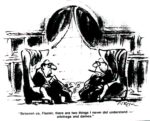From the 1970’s, there has been almost a half-century of development of employee-owned firms. There has been a wide variety of legal/capital structures that have been tried but too little analysis of which legal forms work or don’t work over the longer term, e.g., the transition from one generation to the next generation of employee-owners. This paper provides a critical analysis of the major forms. The emphasis is the lack of learning between the different forms. The same problems keep recurring even though solutions are known.
Intrinsic versus Extrinsic Motivation
This paper reviews some of the classic authors and literature on the subtleties of intrinsic motivation in the human activities where a presumed ‘helper’ (teacher, manager, social worker, etc.) are working with a certain class of ‘doers’ (students, workers, clients, etc.).
Finding the Markets in the Math: Arbitrage and Optimization Theory
This is Chapter 10 from my book: Ellerman, David. 1995. Intellectual Trespassing as a Way of Life: Essays in Philosophy, Economics, and Mathematics. Lanham MD: Rowman & Littlefield.
One of the fundamental insights of mainstream neoclassical economics is the connection between competitive market prices and the Lagrange multipliers of optimization theory in mathematics. Yet this insight has not been well developed. In the standard theory of markets, competitive prices result from the equilibrium of supply and demand schedules. But in a constrained optimization problem, there seems to be no mathematical version of supply and demand functions so that the Lagrange multipliers would be seen as equilibrium prices. How can one “find the markets in the math” so that Lagrange multipliers will emerge as equilibrium market prices?
Are Marginal Products Created ex Nihilo?
This is Chapter 5 from my book: Ellerman, David. 1995. Intellectual Trespassing as a Way of Life: Essays in Philosophy, Economics, and Mathematics. Lanham MD: Rowman & Littlefield.
When an orthodox economist considers the principle of people getting the fruits of labor, he or she will invariably interpret it in terms of marginal productivity. The orthodox claim is that under the conditions of competitive equilibrium, each unit of labor “gets what it produces.” Well-meaning capitalist liberals emphasize that actual capitalism may be neither competitive nor in equilibrium, and in any case, there are enormous difficulties in measuring the “marginal product of each factor of production.” In other words, they accept that interpretation of marginal productivity theory in principle but fuss about its applicability in practice.
The Libertarian Case for Slavery (A Spoof on Nozick)
This is Chapter 3 from my book: Ellerman, David. 1995. Intellectual Trespassing as a Way of Life: Essays in Philosophy, Economics, and Mathematics. Lanham MD: Rowman & Littlefield.
Liberalism is living a lie. It pretends that the contract to sell all of one’s labor, the self-enslavement contract, is an invalid contract beyond the pale while the contract to sell one’s labor piecemeal (by the hour, day, month, or year) is a perfectly valid contract above reproach. The self-enslavement contract is one of the skeletons in liberalism’s intellectual closet. Defenders of liberal capitalism are quick to accept even the most superficial arguments against voluntary slavery just to shove the issue back in the closet—just so long as the arguments do not carry over to the current contract to rent oneself out, the employer-employee contract. Who wants to be seen as, in effect, defending voluntary slavery by showing how most arguments against the self-sale contract are baseless (aside from one “J. Philmore”)?
Myth and Metaphor in Orthodox Economics
This is Chapter 2 from: Ellerman, David. 1995. Intellectual Trespassing as a Way of Life: Essays in Philosophy, Economics, and Mathematics. Lanham MD: Rowman & Littlefield.
Discussion of the fundamental questions of political economy is today almost completely clouded and distorted by a number of basic myths and metaphors. Deconstruction is necessary before constructive discussions can begin. The myths and metaphors are concerned with basic conceptions about property and contract, not with prices and markets. As layer upon layer of distortions are removed, new facts and new perspectives on old facts will emerge. These facts have fairly direct normative implications, but the disagreements and controversies are about the facts, not about norms or prescriptions.
Trespassing against the Happy Consciousness of Orthodox Economics
This is Chapter 1 in my book: Ellerman, David. 1995. Intellectual Trespassing as a Way of Life: Essays in Philosophy, Economics, and Mathematics. Lanham MD: Rowman & Littlefield.
This first chapter addresses the problems of trespassing involved in understanding the arguments presented in the first five “controversial” chapters of the collection. These chapters challenge the whole idea of the employer-employee relationship that is the institutional basis for our present version of a private-property market economy. The problems of trespassing against fundamental orthodoxy in the social and moral sciences are of a completely different order of magnitude than the problems of trespassing in the natural and mathematical sciences.
Kaldor-Hicks Petitio Principii Fallacy
This paper shows that implicit assumptions about the numeraire good in the Kaldor–Hicks efficiency–equity analysis involve a ‘‘same-yardstick’’ fallacy (a fallacy pointed out by Paul Samuelson in another context), a special case of the Petitio Pricipii fallacy.
Finding the Markets in the Math
This paper shows how to find competitive market prices in the pure mathematics of classical constrained optimization problems.



